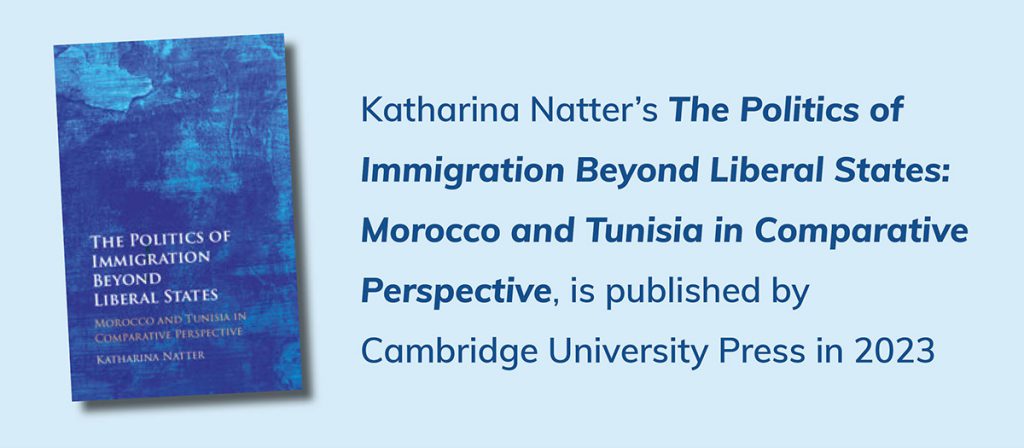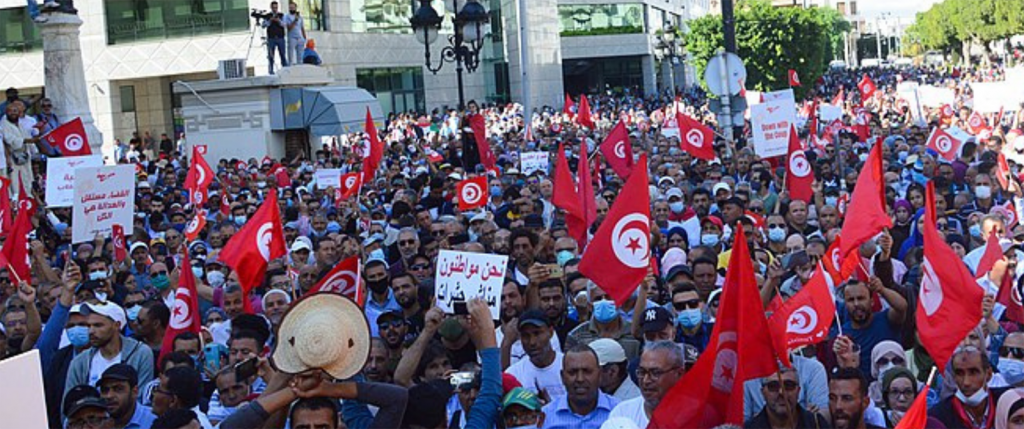Throughout 2023, Tunisia's immigration policies have made headlines, with authoritarian President Kais Saied’s xenophobic speech, a new EU-Tunisia migration deal, and repeated protests condemning violence against Black migrants. But authoritarianism doesn’t inevitably result in increased migrant rights violations. Nor, however, does democratisation guarantee improved rights, as Katharina Natter shows
There is a criminal plan to change the composition of the demographic landscape in Tunisia and some individuals have received large sums of money to give residence to sub-Saharan migrants
kais saied, 21 february 2023
So claimed Tunisian President Saied in a speech to Tunisia's National Security Council. Saied accused 'hordes of illegal migrants' of 'the desire to make Tunisia just another African country and not a member of the Arab and Islamic world.'
Saied's speech legitimised the aggressive, xenophobic campaign that the Tunisian Nationalist Party, hitherto unknown, has led since late 2022. The campaign has had catastrophic consequences for the estimated 21,000 sub-Saharan migrants living in Tunisia.

Since February, Black migrants have been evicted from their homes and violently attacked on the streets. Authorities have systematically expelled them to the borders with Libya and Algeria, regardless of their legal status. Some have been repatriated by their home countries; many have tried to leave Tunisia by sea.
Saied’s speech draws on nationalist tropes and racist narratives familiar to those studying European nationalist-populism. But it also constitutes a fundamental break with how Tunisian politics has dealt with immigration – not only since the 2011 revolution and subsequent democratisation, but also under the previous authoritarian regime of Zine El Abidine Ben Ali. Violence towards Black migrants is not new in Tunisia; yet immigration has always been a non-topic in Tunisian politics.
It would be tempting to explain the xenophobic outburst in Tunisian politics as a side-effect of the regime’s autocratic turn. In July 2021, Saied dissolved Parliament, pushed through a new constitution and arrested dozens of prominent opposition figures. But Tunisia’s history shows that the dynamics between regime type and immigration politics are more complex.

One might assume that authoritarian regimes might foster a culture of racism and xenophobia. Yet former autocratic leader Ben Ali, who led Tunisia between 1987 and 2011, actively suppressed such sentiments.
Indeed, during the 2000s, Tunisia sought to profile itself as a destination for sub-Saharan African students. It was eager to host the African Development Bank. Sub-Saharan African migrants were even cast as the ‘President’s guests’, indirectly protecting them from racial aggression. In contrast with emigration, immigration to Tunisia was not connected to the national identity question. Rather, the government considered it a foreign policy issue with little socio-political relevance.
Back in the early 2000s, sub-Saharan African migrants in Tunisia were cast as the 'President's guests', indirectly protecting them from racial aggression
Surprisingly, the first outburst of xenophobic violence in Tunisia’s recent history occurred in the context of democratisation. The revolution expanded freedom of speech for those advocating for human rights, diversity and equality. However, it also meant that racist and xenophobic voices were no longer taboo. Thus, when Ben Ali’s regime fell in early 2011, the indirect protection availed to Black migrants also disappeared, and migrants then experienced increased violence on Tunisian streets.
At the same time, however, the 2011–2021 period offered a window of opportunity to break with Ben Ali’s top-down, unitary narrative on Tunisia’s Muslim-Arab national identity. Black, Jewish and Amazigh Tunisians mobilised for a more plural understanding of tunisianité. In this context, Black Tunisians and migrant solidarity actors also advocated for a law against racial discrimination. The government eventually passed this law in 2018 – leaving a strong symbolic impact at the time, but little concrete advancement on the ground.
It would be tempting to cast Tunisia’s autocratisation and migration securitisation under Saied as a return to the Ben Ali era. However, the parallel is misleading, given the very different role migration control plays in each regimes’ domestic social contract.
Throughout his rule, Ben Ali maintained power largely by coopting societal and economic elites and repressing Islamist actors. Thus, he exchanged political freedoms for economic stability and security. He also securitised irregular migration and cooperated with EU countries on border controls. This allowed Ben Ali to bolster Tunisia’s image as a reliable geopolitical partner while increasing the state’s capacity for surveillance of Tunisians and foreigners alike. Yet, immigration remained depoliticised domestically and Ben Ali did little to effectively halt migrants leaving for Europe, given the crucial role emigrant remittances play for Tunisia’s population.
Saied scapegoats migrants, instrumentalising fears of identity loss, and bolstering a nationalist-populist agenda in the face of skyrocketing unemployment
Saied, by contrast, scapegoats migrants. This offers him a low-cost, high-gain recipe to distract from his financial and political mismanagement. It also instrumentalises Tunisians' fears of identity loss, and bolsters a nationalist-populist, anti-globalisation agenda in the face of skyrocketing unemployment and food shortages.
Yet Saied also quickly made clear that Tunisia had no intention of becoming Europe’s border guard, crushing Europe’s hope for more effective border controls and migrant return. Instead, the €100 million attached to migration control will probably strengthen Saied’s position in the national security apparatus, and thereby the regime’s authoritarian character, to the detriment of Tunisian citizens and migrants.
The long-term consequences of Saied’s identitarian instrumentalisation of immigration are still unclear. Yet we should avoid jumping to simplistic conclusions. The Tunisian experience shows that democratisation does not go hand in hand with migrant rights. It also reveals that authoritarianism does not automatically lead to more migrant rights violations, or to effective mobility restrictions.
In the current context, this non-deterministic relationship between political regime dynamics and immigration politics can inspire hope. Certainly, it offers one more reason to reinforce support for Tunisia’s human rights and migration solidarity actors – as recent letters by members of the European Parliament and researchers and civil society activists demand. Failing to do so would mean surrendering to the empty promises of autocratic leaders whose repressive politics and economic mismanagement will only drive more people out of Tunisia.